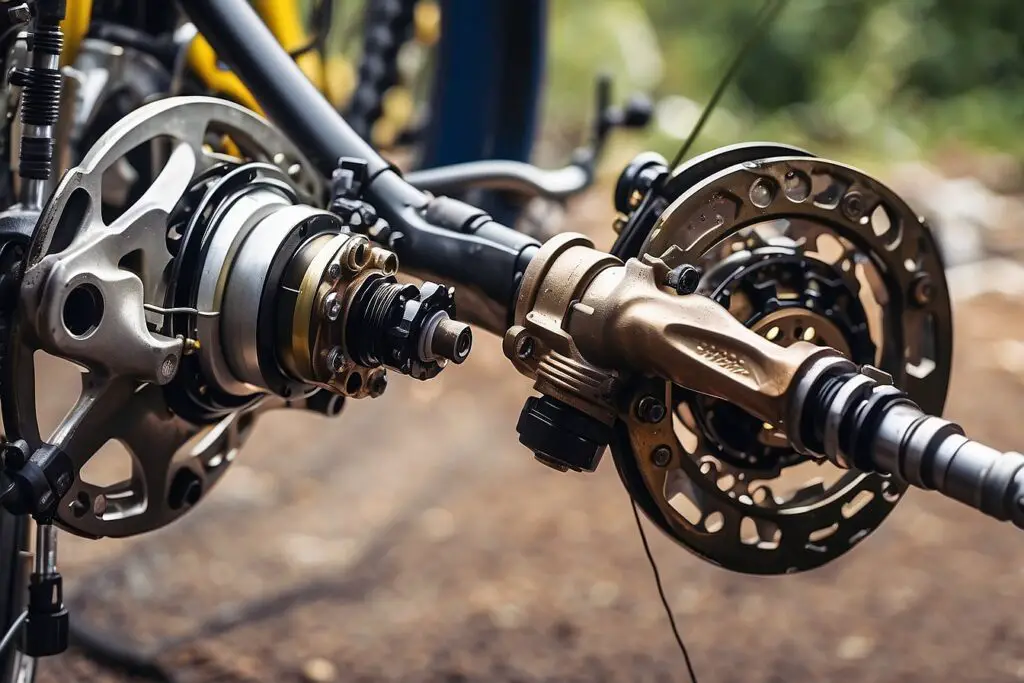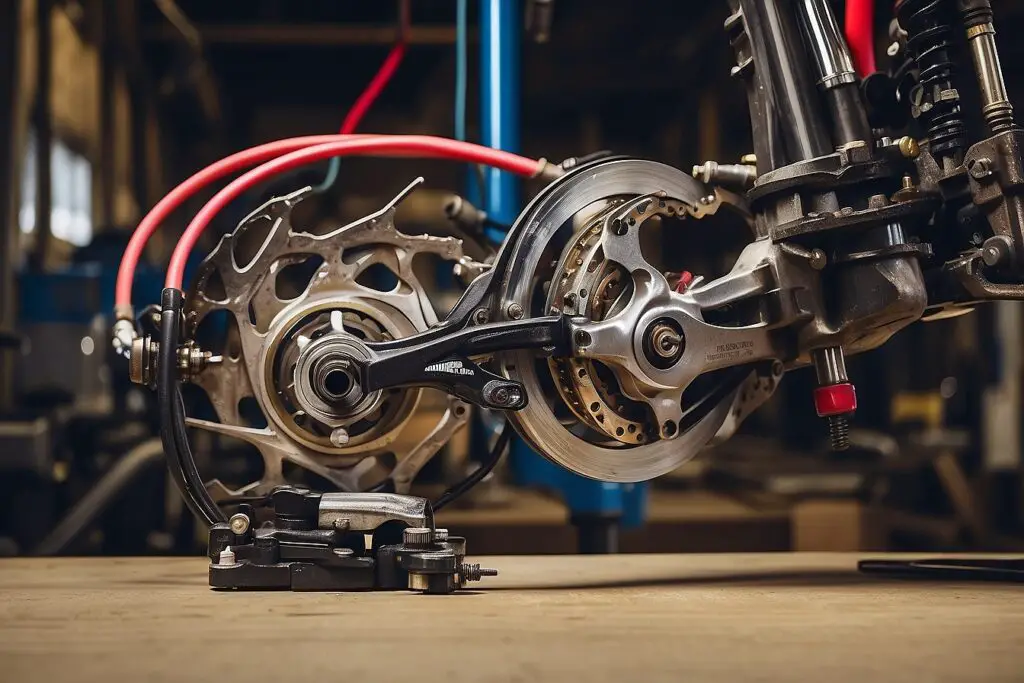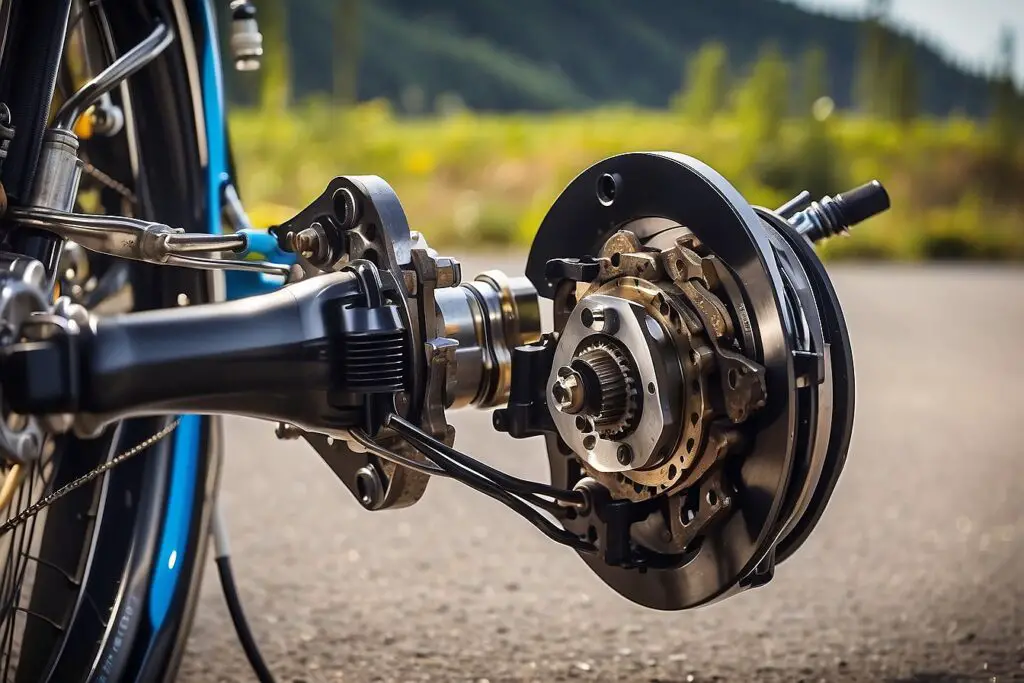Hydraulic Brakes VS Mechanical Brakes: A Comparison
As a cyclist, choosing the right brakes for your bike is important for safety and performance. Hydraulic brakes and mechanical brakes are two popular options. Brake pads are a crucial component of any vehicle, ensuring our safety and control on the road. But with so many options available, it can be quite overwhelming to decide which type of brake system is the best fit for your needs.
Hydraulic and mechanical brakes are two braking systems used in different types of vehicles. Hydraulic brakes utilize fluid pressure to transmit force from the brake pedal to the brake pads, resulting in a smooth and responsive braking experience. On the other hand, mechanical brakes rely on cables and levers to transfer force, providing a more direct and mechanical feel.
By comparing these two types of brake systems, we can determine which offers the best performance, reliability, and overall stopping power. So, buckle up and prepare as we embark on this thrilling adventure through the hydraulic and mechanical brakes world. Let’s find out which brake system will reign supreme.
Table of Contents
What is a disc brake?
A disc brake is a powerful device that brings your car to a halt when you hit the brake pedal. Understanding how it works can help you appreciate the complex mechanisms that keep you safe on the road. The disc brake is a wheel brake that slows the rotation of the wheel by the friction caused by pushing brake pads against a brake disc with a set of calipers. The brake disc, or rotor, is usually made of cast iron but may in some cases be made of composites such as reinforced carbon or ceramic matrix composites.
Disc brakes offer better stopping performance than their counterpart, drum brakes. This is because disc brakes are not as prone to ‘brake fade’ caused by overheating. Plus, they are less affected by water. In a disc brake, the heat generated during braking is easily dissipated into the surrounding air making them an excellent choice for high-performance vehicles and heavy-duty applications. Ensuring your disc brakes are in good working order is vital to your safety as well as the safety of other road users.

What are Hydraulic Brakes?
Hydraulic brakes are brake system that uses hydraulic fluid to transfer the force the driver’s foot applies to the brake pads. This brake system is used on most cars, trucks, and motorcycles today. The brake fluid, usually DOT-3 or DOT-4 (depending on the manufacturer’s specifications), flows through a closed loop of pipes and hoses between the master cylinder, the caliper, and other components.
The main advantages of hydraulic brakes are that they are very powerful, require less effort to operate, and require less maintenance than mechanical brakes. They also provide better control because the brake pads can grip more firmly as the speed increases. The disadvantages include a higher cost and more complex installation and servicing requirements.
How do they work?
Hydraulic brakes, an essential component of modern vehicles, operate on a mechanism that can seem complex but is actually quite straightforward. When you step on the brake pedal, a piston in the master cylinder forces brake fluid through the brake lines to the wheel cylinders or calipers, which then apply pressure to the brake pads or shoes. This pressure creates friction against the brake rotors or drums, slowing and eventually stopping the vehicle.
What’s fascinating about hydraulic brakes is the principle of force multiplication – the concept that a small amount of force applied at one point can create a significant amount of force at another point. This mechanism allows hydraulic brakes to deliver powerful stopping force with minimal effort from the driver. Understanding the working of these brakes can not only satisfy your curiosity but also help you appreciate the importance of regular maintenance to ensure your brakes are always in top working condition.
What are Mechanical Brakes?
Mechanical brakes are the more traditional braking system used on older cars, trucks, and motorcycles. In this system, the force from the driver’s foot is transferred to the brake pads via a physical connection, such as a cable or rod.
The main advantages of mechanical brakes are that they cost less, have simpler installation and servicing requirements, and require less maintenance than hydraulic brakes. On the other hand, mechanical brakes are less powerful and require more effort than hydraulic ones.
Hydraulic brakes, in contrast, use pressurized brake fluid to operate the braking system. This fluid is transferred from the master cylinder to the calipers with a hydraulic line. The pressure generated by the master cylinder pushes against a piston inside the caliper, which then actuates the brake pads.
This process is much more efficient than mechanical braking systems and requires less pedal effort from drivers. Hydraulic brakes are also much more powerful and provide more control over the braking process.
How do they work?
Mechanical brakes are an absolutely fascinating and crucial component of any vehicle. But how do they work? These brakes function on the principle of friction, transforming the kinetic energy of the moving vehicle into heat energy which eventually brings the vehicle to a halt. When you press the brake pedal, it sets a chain of mechanisms into motion. This force is transferred through a system of levers and springs to the brake shoes, pushing them against the brake drum.
The friction between the brake drum and brake shoes generates heat, slowing down and eventually stopping the vehicle. Understanding the function of mechanical brakes not only gives us a deeper appreciation of the engineering genius behind our vehicles, but it also helps us to drive more responsibly. When we know the effort and science that goes into every single stop on the road, we’re more likely to respect the limits of our vehicles and prioritize safety on the roads.
Hydraulic Brakes vS Mechanical Brakes: A Comparison
Hydraulic and mechanical brakes are two of the most common brakes used in automobiles. While both can provide adequate braking performance, some differences should be considered when choosing which brake to install on a vehicle.
The main difference between hydraulic and mechanical brakes is how they transfer force from the driver’s foot to the brakes. Hydraulic brakes use a pressurized hydraulic line to transfer the force, while mechanical brakes use a cable or rod.
Hydraulic brakes are more powerful and require less effort than mechanical brakes. They also provide better control over the braking system as the brake pads can grip more firmly as speed increases. On the other hand, hydraulic brakes are more expensive and have more complex installation and servicing requirements than mechanical brakes.
Regarding maintenance, hydraulic brakes usually require less attention than mechanical brakes. Hydraulic brakes do not need as frequent adjustments and lubrication as mechanical brakes, and the fluid in the line does not need to be changed as often.
This makes them an excellent choice for those who want an easy-to-maintain braking system. On the other hand, mechanical brakes require more regular maintenance as the cables and rods need to be checked for wear and tear, and the system needs to be periodically lubricated.

Is it worth the effort of switching from hydraulic Shimano MT200 to mechanical discs?
Switching from hydraulic Shimano MT200 to mechanical disc brakes is definitely worth the effort. While hydraulic disc brakes offer better modulated, more powerful, and reliable braking performance, many riders still prefer mechanical disc brakes for their simplicity, ease of maintenance, and lower cost. Mechanical disc brakes are also easier to adjust and repair, which can save time and money in the long run.
Additionally, mechanical disc brakes provide a more consistent braking feel as they are not affected by changes in temperature or altitude, unlike hydraulic disc brakes which can suffer from brake fade. While there may be a slight learning curve in getting used to the different feel and maintenance of mechanical disc brakes, many riders find the trade-off to be well worth it in terms of cost savings and ease of use. Overall, the switch from hydraulic Shimano MT200 to mechanical disc brakes can provide a more reliable and cost-effective braking solution for many riders.
Advantages And Disadvantages of Hydraulic Brakes
1. Advantages of Hydraulic Brakes
– Better stopping power: Hydraulic brakes provide more power than mechanical ones.
– Less maintenance: As hydraulic brakes are self-adjusting, they require less maintenance and do not need frequent adjustments.
– Smooth braking: Hydraulic brakes provide a smooth and controlled braking experience, which is important during emergencies.
– Consistent performance: Hydraulic brakes provide consistent and reliable braking performance regardless of the temperature or weather conditions.
2. Disadvantages of Hydraulic Brakes
– Expensive: Hydraulic brakes are more expensive than traditional mechanical ones, making them less accessible to the average consumer.
– Complex system: Hydraulic brakes are more complex than traditional mechanical brakes, making them harder to repair and requiring specialized knowledge and equipment.
– Requires fluid: Hydraulic brakes rely on hydraulic fluid to function correctly. Regular fluid replacements are necessary to keep the brakes in good working condition.
– Requires bleeding: To maintain the hydraulic system’s performance, periodic bleeding is necessary to prevent air from getting trapped inside the lines and causing brake failures.
Advantages and Disadvantages of Mechanical Brakes
Different types of brakes are available when it comes to stopping power for vehicles. Mechanical brakes are one of those types, and they use cables, levers, and other mechanisms to apply pressure on the brake pads or drum, slowing down or stopping the vehicle. In this article, we will discuss the advantages and disadvantages of mechanical brakes so you can make the best decision for your vehicle.
Advantages:
1. Easy to maintain and repair: Mechanical brakes are relatively simple and easy to maintain and repair. They do not require electronic components or fluids; you can easily replace the brake pads or drum.
2. Low cost: Mechanical brakes are generally less expensive than other brake systems, such as hydraulic and electric brakes, making them an attractive option for those on a budget.
3. Reliable: Mechanical brakes are well-known for their dependability and reliability. They can withstand harsh weather conditions and long-term wear and tear.
4. Less prone to leakage and contamination: Since mechanical brakes are not hydraulic, they are less prone to leaks and contamination from brake fluid.
Disadvantages:
1. Lower stopping force: Mechanical brakes exert less than hydraulic or electric brakes, making it harder to stop a vehicle in an emergency.
2. Limited braking power: Mechanical brakes have limited power, especially when the vehicle is loaded.
3. Limited adjustability: Mechanical brakes offer limited adjustability compared to hydraulic brakes. You cannot adjust the brake pressure as frequently or accurately, affecting the consistency of your stopping power.
4. Increased maintenance: While mechanical brakes are easy to maintain, they may require more frequent maintenance due to the wear of the mechanical components.
Are new mechanical disc brakes really bad?
There is a common misconception that new mechanical disc brakes are bad, but that is not necessarily true. While it is true that hydraulic disc brakes generally offer better performance and more precise control, that does not mean that mechanical disc brakes are inherently bad. In fact, modern mechanical disc brakes have greatly improved in recent years and can provide reliable stopping power for most riders. They are also easier to maintain and more affordable than hydraulic disc brakes, making them a popular choice for budget-friendly bikes.
Additionally, some riders may actually prefer the feel and modulation of mechanical disc brakes over hydraulic ones. Ultimately, the decision between mechanical and hydraulic disc brakes comes down to personal preference, budget, and the specific needs of the rider. So, while hydraulic disc brakes may be the superior choice for some riders, new mechanical disc brakes are not inherently bad and can still offer a reliable and cost-effective braking solution for many cyclists.

How to Maintenace Brakes?
Maintaining brakes is essential to ensure they are functioning correctly and safely. You must regularly check your brakes for any signs of wear or damage and keep up with the maintenance schedule suggested by your car’s manufacturer. Whether you have hydraulic or mechanical brakes, you should take a few steps to ensure they remain in good condition.
You should check the brake fluid level for hydraulic brakes and replace it as needed. It is also important to regularly inspect the brake lines for any signs of leaks or damage. Additionally, you should clean and lubricate the pads and rotors as your car’s manufacturer recommends.
For mechanical brakes, it is important to regularly check the cables and rods for signs of wear or damage. You should also lubricate the components and adjust the brakes to ensure they remain effective. Additionally, you should inspect the brake pads for signs of wear and replace them if necessary.
When it comes to maintaining brakes, proper inspection and servicing are key. Regular visual inspections can help you identify potential issues before they become more serious.
If hydraulic brakes are installed on your vehicle, you should check the fluid level and pressure and inspect the lines for any damage or leaks. Checking the cables and rods for wear or damage with mechanical brakes is important.
Are cheap discs and pads safe and worth it?
Cheap discs and pads may seem like a cost-effective option, but when it comes to safety, they may not always be the best choice. While some budget-friendly options can still provide adequate performance and reliability, others may be made from lower-quality materials that can compromise safety and performance.
In some cases, cheap discs and pads may wear out more quickly, potentially leading to reduced braking capability and increased risk of accidents. It’s important to consider the long-term costs and safety implications when choosing braking components, as investing in higher-quality discs and pads from reputable brands can provide better performance, durability, and peace of mind.
Ultimately, the decision comes down to weighing the potential risks and benefits and considering the importance of reliable braking in ensuring the safety of yourself and others on the road. So, while cheap discs and pads may seem like a good deal upfront, in the long run, it’s worth considering the potential trade-offs in safety and performance.
Frequently Asked Questions [FAQs]
1. How Much Better Are Hydraulic Brakes Than Mechanical Ones?
Hydraulic brakes are a major improvement over mechanical brakes, and it’s easy to see why. Hydraulic brakes offer superior braking force because they use hydraulic pressure instead of friction created between two surfaces. Hydraulic brakes can provide more stopping power than mechanical brakes, even when using less effort.
2. What Is The Comparison Between Mechanical And Hydraulic Brakes?
Comparing mechanical and hydraulic brakes is important when purchasing a new vehicle. Mechanical brakes rely on a physical connection between the brake pedal and the brakes, while hydraulic brakes use pressurized fluid to provide braking force.
3. Which Is Better, Hydraulic Or Mechanical?
Hydraulic brakes are typically considered superior because they provide more consistent stopping power and an improved pedal feel. The fluid in a hydraulic brake system creates a more responsive and consistent braking action than in a mechanical brake system. However, hydraulic brakes may require more maintenance than mechanical brakes due to the fluid in the lines that need to be changed periodically.
4. Why Is Hydraulic Better Than Mechanical?
Hydraulic brakes are significantly better than mechanical brakes for a variety of reasons. Hydraulic brakes are much more efficient, provide more stopping power, require less maintenance, and offer better adjusting capabilities than their mechanical brake counterparts.
5. Are Hydraulic Brakes The Best?
Hydraulic brakes are considered the superior braking system compared to mechanical brakes. This is due to a variety of reasons. Hydraulic brakes are generally characterized by using compressed hydraulic fluid to transfer force from the brake pedal or lever to the caliper that clamps onto the brake rotors, which causes friction and ultimately slows down the wheels. This offers several advantages over traditional mechanical brakes, including more efficient braking, improved brake feel, and better adjustability.
Conclusion
Overall, it really comes down to personal preference and the type of cycling you do. Mechanical brakes can be a great option if you’re a recreational cyclist or commuting through flat terrain. They’re affordable, easy to maintain, and provide good stopping power. However, if you’re a serious mountain biker or regularly tackle steep terrain, hydraulic brakes are likely the better option.
They offer more reliable stopping power and require less effort to operate. Ultimately, the choice is yours. Take your time to consider your needs, budget, and riding style before making a decision. And of course, don’t forget to always prioritize safety when it comes to choosing the right brakes for your bike.
